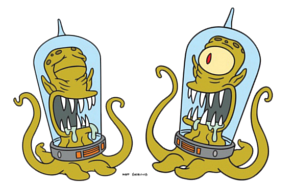The prevailing secular worldview is a pastiche of current scientific orthodoxy and pious hopes. Darwin has shown that we are animals; but - as humanists never tire of preaching - how we live is ‘up to us’. Unlike any other animal, we are told, we are free to live as we choose. Yet the idea of free will does not come from science. Its origins are in religion - not just any religion - but the Christian faith against which humanists rail so obsessively.
[...]
Some readers have seen
Straw Dogs as an attempt to apply Darwinism to ethics and politics, but nowhere does it suggest that neo-Darwinian orthodoxy contains the final account of the human animal. Instead Darwinism is deployed strategically in order to break up the prevailing humanist worldview. Humanists turn to Darwin to support their shaky faith in progress; but there is no progress in the world he revealed. A truly naturalistic view of the world leaves no room for secular hope.
[...]
The Buddhist ideal of awakening implies that we can sever our links with our evolutionary past. We can raise ourselves from the sleep in which other animals pass their lives. Our illusions dissolved, we need no longer suffer. This is only another doctrine of salvation, subtler than that of the Christians, but no different from Christianity in its goal of leaving our animal inheritance behind.
[...]
Having lost the skills of sewing, fishing and making fire, the indigenous people of Tasmania lived more simply than even Aboriginals on the Australian mainland from whom they had been isolated by rising sea levels around ten thousand years ago. When the ships bearing European settlers arrived in Tasmania in 1772, the indigenous people seem not to have noticed them. Unable to process a sight for which nothing had prepared them, they returned to their ways.
They had no defences against the settlers. By 1830, their numbers had been reduced from around five thousand to seventy-two. In the intervening years they had been used for slave labour and sexual pleasure, tortured and mutilated. They had been hunted like vermin and their skins had been sold for government bounty. When the males were killed, female survivors were turned loose with the heads of their husbands tied around their necks. Males who were not killed were usually castrated. Children were clubbed to death. When the last indigenous Tasmanian male, William Lanner, died in 1869, his grave was opened by a member of the Royal Society of Tasmania, Dr George Stokell, who made a tobacco pouch from his skin. When the last ‘fullblood’ indigenous woman died a few years later, the genocide was complete.
Genocide is as human as art or prayer. This is not because humans are a uniquely aggressive species. The rate of violent death among some monkeys exceeds that among humans - if wars are excluded from the calculation; but as E.O. Wilson observes, ‘if hamdryas baboons had nuclear weapons, they would destroy the world in a week’. Mass murder is a side effect of progress in technology. From the stone axe onwards, humans have used their tools to slaughter one another. Humans are weapon-making animals with an unquenchable fondness for killing. (from Straw Dogs by John Gray)








 .
. . (Bad shooting is of course a vastly bigger problem. It can happen to everybody it just happens much more to some ...)
. (Bad shooting is of course a vastly bigger problem. It can happen to everybody it just happens much more to some ...)







Bookmarks